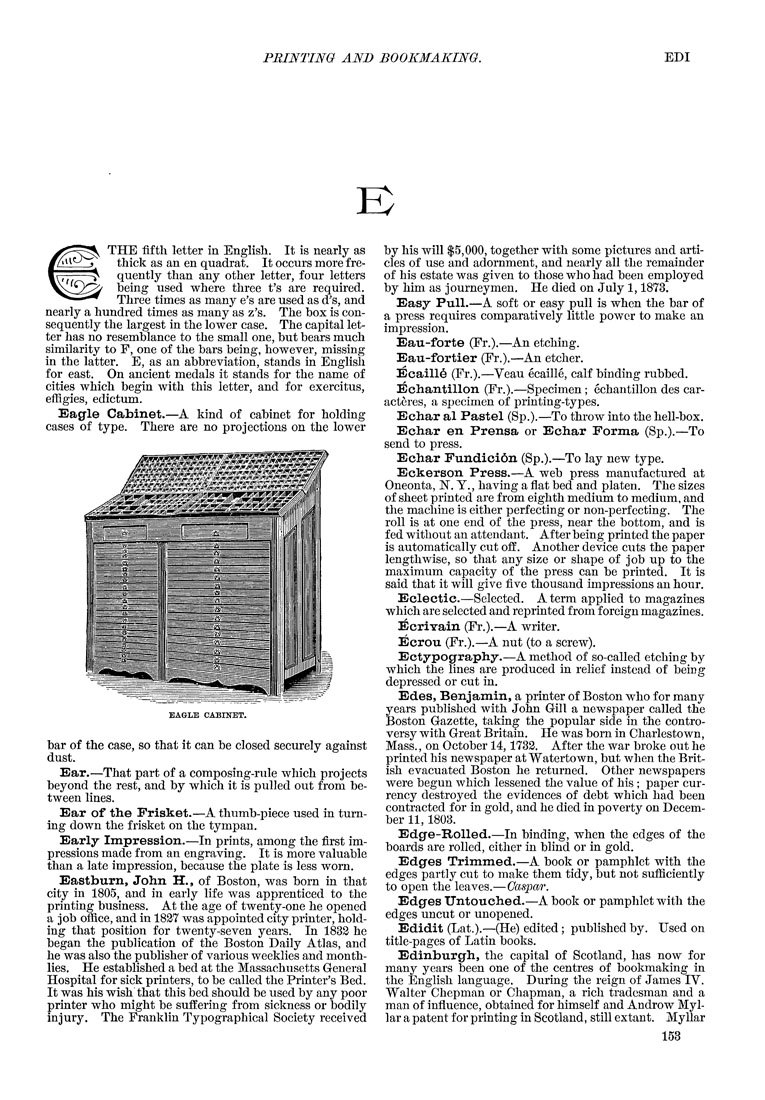PRINTING AND BOOKMAKING.
EDI
E)
y^^^ THE fifth letter in English. It is nearly as
fhW^-^^ thick as an en quadrat. It occurs more fre-
ly, -^ quently than any other letter, four letters
\v^^^ being used where three t's are required.
Three times as many e's are used as d's, and
nearly a hundred times as many as z's. The box is con¬
sequently the largest in the lower case. The capital let¬
ter has no resemblance to the small one, but bears much
similarity to F, one of the bars being, however, missing
in the latter. E, as an abbreviation, stands in English
for east. On ancient medals it stands for the name of
cities which begin with this letter, and for exercitus,
effigies, edictum.
Eagle Cabinet.—A kind of cabinet for holding
cases of type. There are no projections on the lower
EAGLE CABINET.
bar of the case, so that it can be closed securely against
dust.
Ear.—That part of a composing-rule which projects
beyond the rest, and by which it is pulled out from be¬
tween lines.
Ear of the Frisket.—A thumb-piece used in turn¬
ing down the frisket on the tympan.
Early Impression.—In prints, among the first im¬
pressions made from an engraving. It is more valuable
than a late impression, because the plate is less worn.
Eastburn, John H., of Boston, was born in that
city in 1805, and in early life was apprenticed to the
printing business. At the age of twenty-one he opened
a job office, and in 1827 was appointed city printer, hold¬
ing that position for twenty-seven years. In 1832 he
began the publication of the Boston Daily Atlas, and
he was also the publisher of various weeklies and month¬
lies. He established a bed at the Massachusetts General
Hospital for sick printers, to be called the Printer's Bed.
It was his wish that this bed should be used by any poor
printer who might be suffering from sickness or bodily
injury. The Franklin Typographical Society received
by his will $5,000, together with some pictures and arti¬
cles of use and adornment, and nearly all the remainder
of his estate was given to those who had been employed
by him as journeymen. He died on July 1,1873.
Easy Pull.—A soft or easy pull is when the bar of
a press requires comparatively little power to make an
impression.
Eau-forte (Fr.).—An etching.
Eau-fortier (Fr.).—An etcher.
Ecaill6 (Fr,).—Veau ecaille, calf binding rubbed.
Echantillon (Fr.).—Specimen ; echantillon des car¬
acteres, a specimen of printing-types.
Echar al Pastel (Sp.).—To throw into the hell-box.
Echar en Prensa or Echar Forma (Sp.).—To
send to press.
Echar Fundicion (Sp.).—To lay new type.
Eckerson Press.—A web press manufactured at
Oneonta, N. Y., having a fiat bed and platen. The sizes
of sheet printed are from eighth medium to medium, and
the machine is either perfecting or non-perfecting. The
roll is at one end of the press, near the bottom, and is
fed without an attendant. After being printed the paper
is automatically cut off. Another device cuts the paper
lengthwise, so that any size or shape of job up to the
maximum capacity of the press can be printed. It is
said that it will give five thousand impressions an hour.
Eclectic.—Selected. A term applied to magazines
which are selected and reprinted from foreign magazines.
Ecrivain (Fr.).—A writer.
Ecrou (Fr.).—A nut (to a screw).
Ectypography.—A method of so-called etching by
which the lines are produced in relief instead of being
depressed or cut in.
Edes, Benjamin, a printer of Boston who for many
years published with John Gill a newspaper called the
Boston Gazette, taking the popular side in the contro¬
versy with Great Britain. He was born in Charlestown,
Mass., on October 14,1732. After the war broke out he
printed his newspaper at Watertown, but when the Brit¬
ish evacuated Boston he returned. Other newspapers
were begun which lessened the value of his ; paper cur¬
rency destroyed the evidences of debt which had been
contracted for in gold, and he died in poverty on Decem¬
ber 11, 1803.
Edge-Rolled.—In binding, when the edges of the
boards are rolled, either in blind or in gold.
Edges Trimmed.—A book or pamphlet with the
edges partly cut to make them tidy, but not sufficiently
to open the leaves.—Caspar.
Edges Untouched.—A book or pamphlet with the
edges uncut or unopened.
Edidit (Lat.).—(He) edited; pubhshed by. Used on
title-pages of Latin books.
Edinburgh, the capital of Scotland, has now for
many years been one of the centres of bookmaking in
the English language. During the reign of James IV.
Walter Chepman or Chapman, a rich tradesman and a
man of infiuence, obtained for himself and Andrew Myl-
lar a patent for printing in Scotland, still extant. Myllar
153
|








